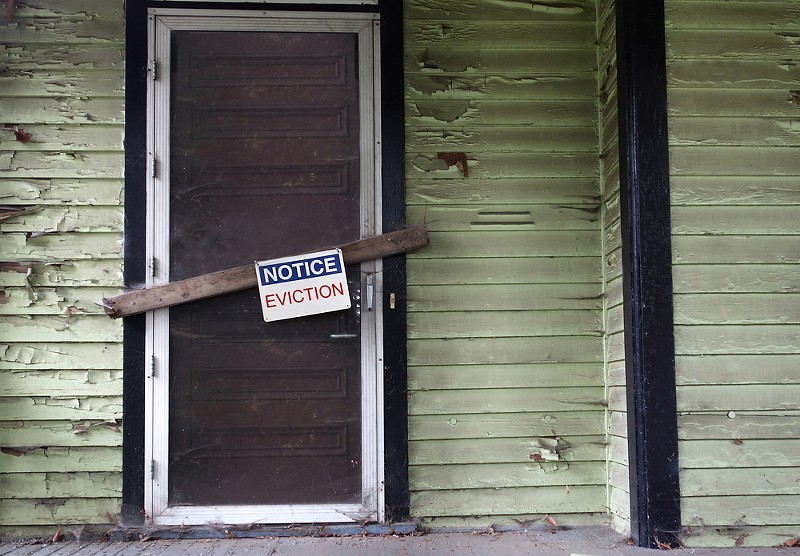It was good while it lasted. Dallas County’s eviction moratorium ended June 15, effectively halting certain protections for thousands of North Texas tenants.
Tuesday, DeSoto City Council member Candice Quarles delivered a bleak forecast for Dallas evictions during a virtual town hall meeting on Zoom. She said considering the county’s current unemployment rate, a tidal wave of displacements could be around the corner.
“When you see unemployment that high, usually evictions will follow,” she said.
Scores of North Texans are unable to pay rent after losing their jobs as a result of the coronavirus pandemic, tenants' rights advocates say. Now that the eviction moratorium has expired, thousands could soon lose their homes.
According to the U.S. Bureau of Labor Statistics, Dallas-Fort Worth-Arlington's unemployment rate was 12.8% this April, which is more than four times higher than it was in April 2019. That percentage dwarfs the area's previous high of 8.7%, which occurred during the peak of the financial crisis in 2009.
Since June 15, Texas Tenants’ Union executive director Sandy Rollins has tried contacting each of the county’s justice of the peace courts to gauge how many evictions are being processed. Although it’s difficult to know for sure, she estimates that the total number of hearings could reach 200 per day, or 1,000 per week.
“That’s a pretty big number of people who are teetering on the edge, and the numbers are surging,” Rollins said.
When the moratorium ended, eviction hearings resumed in the county’s 10 justice of the peace courts. Five courts had not responded to requests for comment by publication time.
Justice of the Peace Courts 1-2, 2-1 and 2-2 reported that they were not expecting to see an abnormal number of eviction hearings for the remainder of the month. Judge Steve Seider said he's heard between 25 and 30 of the 150 cases that were scheduled at Court 3-2. The rest were dismissed "for a variety of reasons," including instances where tenants had vacated the property or paid what they owed in rent.
However, a representative for Justice of the Peace Court 1-1 said the court is anticipating an increase in cases through the end of June. Since reopening, it's seen 197 cases. It has another 253 slated through July 6.
During the virtual town hall, Judge Sasha Moreno from Justice of the Peace Court 4-2 said that she encourages all tenants to know their rights. As a judge, she is not allowed to advocate for people, she said.
For instance, under the Coronavirus Aid, Relief and Economic Security Act, landlords with federally backed mortgages cannot evict tenants for nonpayment until July 25. The occupant then has an additional 30 days to vacate.
In an eviction hearing, though, Moreno said she cannot ask the tenant whether they are eligible for such CARES Act protections.
“It’s very important for you tenants to really understand what laws apply to you,” she said, “because it’s up to you to bring that up as a defense.”
Tenants who’d like to know if their dwelling is covered by the CARES Act can check a database by the National Low Income Housing Coalition.
The Housing Crisis Center is a nonprofit dedicated to keeping Dallas residents from becoming homeless. In addition to providing legal assistance, the organization offers aid for utilities, rent or mortgage.
Since the pandemic began, the nonprofit has witnessed an increase in calls for assistance, said Kelvin Brown, the housing nonprofit's CEO.
“Across the board, it’s spiked because of COVID,” he said. “But then we also know those calls have even increased a little bit more since the moratorium ended.”
"Policymakers really need to step it up." – Sandy Rollins, executive director of Texas Tenants' Union
tweet this
'Patchwork' Policies
Even though the eviction shutdown is over, some policymakers have tried to implement other solutions. The Dallas City Council voted Wednesday to expand its rental and mortgage assistance program by an additional $10 million, The Dallas Morning News reported. That could help some 2,000 tenants pay rent.Yet Rollins said the program doesn’t go far enough. She knows some renters who haven’t gotten relief since signing up for its first incarnation in April.
"Policymakers really need to step it up,” she said.
In addition to the rental assistance program, Dallas’ COVID Notice of Possible Eviction ordinance buys some renters time. It gives eligible tenants 21 days to prove the pandemic has slashed their income. They then have another 60 days to make up unpaid rent.
Tenants who rent from landlords facing foreclosure are also aided by the federal Protecting Tenants at Foreclosure Act. The law allows them to remain in their homes for the remainder of their lease, or at least 90 days, whichever is greater.
In May, the U.S. House of Representatives passed the Health and Economic Recovery Omnibus Emergency Solutions Act, which would give $200 billion for housing and homelessness programs. The Senate has yet to vote on the HEROES Act.
But Rollins said these local and federal policies make up a tattered “patchwork” of protections. Lawmakers should instead pass a uniform eviction moratorium to last the remainder of the pandemic, she said.
“We need to just settle in and accept that this is unprecedented and deal with this in an unprecedented way in order to not create massive harm,” Rollins said.
“I think we all need a gap year, so to speak,” she added. “Let’s put everything on hold.”












